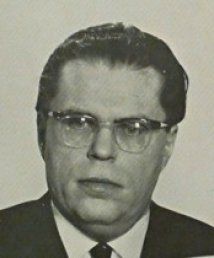Erik Werba
Erik Werba was born on 23 May 1918 in Baden bei Wien (Austria). His father was a Kapellmeister and so he attended lessons in violin, piano and music theory (under Hans Völgyfy) from an early age. He later studied music and also classical philology at the Viennese University and music theory and composition under Joseph Marx as well as piano under Oskar Dachs at the Viennese Music Academy. Erik Werba also worked as a music critic for several Viennese newspapers at that time. Then he was drafted for military service during World War II and returned unwounded.
After World War II he first worked as conductor at the city theatre in Baden bei Wien for one season. Then Erik Werba became the director of the Mozartgemeinde Wien and co-founded the musical journal "Musikerziehung". Since 1949 he lectured lied and oratorio at the Viennese Music Academy, in 1954 he was appointed professor and held that position until his retirement in 1990. Over the years Erik Werba gained an outstanding reputation as teacher for young singers.
Around 1950 he also began his international career as a lieder accompanist for such famous singers like Irmgard Seefried, Christa Ludwig, Peter Schreier or Walter Berry. Beside his teaching and performing career Erik Werba was also a member of the editorial staff of the journal "Österreichische Musikzeitschrift".
For his work Erik Werba was awarded the Austrian Cross of Honour for Science and Art First Class in 1968, the Cultural Award of the City Baden in 1969, the Cultural Award of the State Lower Austria in 1974 and many other awards in Austria and abroad.
Erik Werba died on 19 April 1992 in Hinterbrühl (Austria).
Erik Werba also wrote books, mainly biographies on composers like Richard Strauss, Joseph Marx, Erich Marckhl or Hugo Wolf. Among his own compositions are the singspiel "Trauben für die Kaiserin" (1948), incidental music, several works for violin and piano and many songs and song cycles.
In my possession are three autograph manuscript of songs by Erik Werba.
The first song is "Ich bin..." for tenor or soprano and piano. The work was composed in 1936 on words by Franz Christel (1865-1931), an Austrian poet who worked as Viennese town registrar. The manuscript has a handwritten dedication by Erik Werba that says: "Frau Maria Christel in Verehrung zum Weihnachstfeste 1936 - Baden, 24. Dezember 1936". It is very likely that this Maria Christel was the wife or daughter of Franz Christel.
The second song is called "Ich saß vor dunklem Walde.." and is scored for tenor or soprano and piano.
The third song "Neige dein Köpfchen" is set for baritone and piano. Both songs are again on words by Franz Christel and are written on the same "J.E. & Co. Protokoll Schutzmarke No.2 12linig" like the first song. There is no dedication nor a date on these manuscripts, but it is very likely that they were written around 1936 as well.
